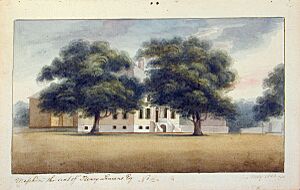Mepkin Abbey facts for kids
| Monastery information | |
|---|---|
| Order | Trappist |
| Archdiocese | Archdiocese of Atlanta |
| Diocese | Diocese of Charleston |
| Abbot | Joseph Tedesco |
| Archbishop | Gregory John Hartmayer |
| Bishop | Jacques E. Fabre |
| Site | |
| Location | Moncks Corner, South Carolina |
| Country | United States |
| Coordinates | 33°7′N 79°57′W / 33.117°N 79.950°W |
| Website | https://mepkinabbey.org/ |
Mepkin Abbey is a special place where Trappist monks live and pray. It is a monastery located in Berkeley County, South Carolina, in the United States. The abbey is found near Moncks Corner, where two parts of the Cooper River meet. It is northwest of Charleston. This peaceful place is part of the Diocese of Charleston.
Contents
History of Mepkin Abbey
The area around Mepkin Abbey has been called "Mepkin" for hundreds of years. Native American tribes lived here long ago. The name "Mepkin" was first written down in 1681. This was when land was given to the sons of Sir John Coleton. He was one of the Lords Proprietary of South Carolina.
From Plantation to Monastery
In 1762, a family member of Sir John Coleton sold the land. It was bought by Henry Laurens, a famous person from Charleston. Laurens built his home there. This large property became known as the Mepkin Plantation.
After some time, the Laurens family sold the property. It was owned by several different people. In 1936, a well-known publisher named Henry R. Luce bought the land. The plantation was very large, over 7,200 acres. When the Luces bought it, Henry Laurens' original house was gone. A newer house, built in 1906, was on the property.
New York architect Edward Durell Stone designed a new house for the Luces in 1936. Henry's wife, Clare Boothe Luce, created a beautiful and large garden there. It was called the Mepkin Garden. In 1949, the Luces gave a big part of their property to the Trappist Order. This included the lovely garden.
Twenty-nine monks from Gethsemani, Kentucky, came to Mepkin. They started the new Mepkin Abbey. Today, the Abbey and the Mepkin Gardens are open to visitors most days. The monastery grounds also have a graveyard. Here, you can find the ashes of Henry Laurens. The graves of John Laurens, Clare Boothe Luce, and Henry Luce are also there. The gardens are now known as the Mepkin Abbey Botanical Garden.
From Eggs to Mushrooms
For many years, Mepkin Abbey earned money by producing eggs. However, in December 2007, the monks decided to stop this operation. They felt that the egg production was causing concerns and disturbing their quiet, monastic way of life. After careful thought, they chose to start growing mushrooms instead. This new activity helps support the abbey and fits better with their peaceful lifestyle.
Mepkin Abbey Botanical Garden
The beautiful gardens at Mepkin Abbey started as part of the Mepkin Plantation. This was the home of American patriot Henry Laurens. His house was burned down twice. First, by British forces during the American Revolutionary War. Later, by the Union army in the Civil War.
Today's garden was created by publisher Henry R. Luce and his wife Clare Boothe Luce. They are both buried at the site. The garden has many old live oak trees. It also features a special camellia garden. This part was designed by landscape architect Loutrel Briggs. The garden is open to the public every day except Mondays.
Leaders of Mepkin Abbey
Abbots and Superiors
The abbots and superiors are the leaders of the monastery. Here is a list of the monks who have led Mepkin Abbey:
| Years | Abbot |
|---|---|
| 1949 - 1974 | Anthony Chassagne |
| 1974 - 1989 | Christian Carr |
| 1990 - 2006 | Francis Kline |
| 2007 - 2018 | Stanislaus Gumula |
| 2018 - Curr | Joseph Tedesco |
See also







